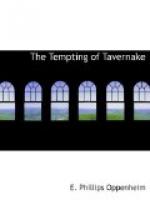common sense. He remembered that he must have
food and drink, and he sought them from the wayside
public-house like an ordinary traveler, conquering
without any apparent effort that first invincible
repugnance of his toward the face of any human being.
Then on again across this strange land of windmills
and spreading plains, until the darkness forced him
to take shelter once more. That night he slept
like a child. With the morning, the fever had
passed from his blood. A great wind blew in his
face even as he opened his eyes, touched to wakefulness
by the morning sun, a wind that came booming over
the level places, salt with the touch of the ocean
and fragrant with the perfume of many marsh plants.
He was coming toward the sea now, and within a very
short distance from where he had spent the night,
he found a broad, shining river stealing into the
land. With eager fingers he stripped himself
and plunged in, diving again and again below the surface,
swimming with long, lazy strokes backwards and forwards.
Afterwards he lay down in the warm, dry grass, dressed
himself slowly, and went on his way. The wind,
which had increased now since the early morning, came
thundering across the level land, bending the tops
of the few scattered trees, sending the sails of the
windmills spinning, bringing on its bosom now stronger
than ever the flavor of the sea itself, salt and stimulating.
Tavernake told himself that this was a new world into
which he was coming. He would pass into its
embrace and life would become a new thing.
Towards evening with many a thrill of reminiscence,
he descended a steep hill and walked into a queer
time-forgotten village, whose scattered red-tiled
cottages were built around an arm of the sea.
Boldly enough now he entered the one inn which flaunted
its sign upon the cobbled street, and, taking a seat
in the stone-floored kitchen, ate and drank and bespoke
a bed. Later on, he strolled down to the quay
and made friends with the few fishermen who were loitering
there. They answered his questions readily,
although he found it hard at first to pick up again
the dialect of which he himself had once made use.
The little place was scarcely changed. All
progress, indeed, seemed to have passed it by.
There were a handful of fishermen, a boat-builder
and a fish-curer in the village. There was no
other industry save a couple of small farmhouses on
the outskirts of the place, no railway within twelve
miles. Tourists came seldom, excursionists never.
In the half contented, half animal-like expression
which seemed common to all the inhabitants, Tavernake
read easily enough the history of their uneventful
days. It was such a shelter as this, indeed,
for which he had been searching.
On the second night after his arrival, he walked with
the boatbuilder upon the wooden quay. The boatbuilder’s
name was Nicholls, and he was a man of some means,
deacon of the chapel, with a fair connection as a
jobbing carpenter, and possessor of the only horse
and cart in the place.




